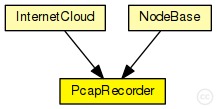 This documentation is released under the Creative Commons license
This documentation is released under the Creative Commons licenseRecords PCAP traces of frames sent/received by other modules within the same host. By default, it records frames sent/received by L2 modules of StandardHost and Router. The output filename is expected in the pcapFile parameter. The PcapRecorder module can also print tcpdump-like textual information to on the log (EV); this functionality can be controlled by the verbose parameter.
Which modules to record: The list of modules can to be specified in the moduleNamePatterns parameter. It is a space-separated list of module names, which will be interpreted as children of the PcapRecorder's parent module. To record elements of a module vector, add "[*]" to the name (example: "eth[*]").
Operation: PcapRecorder adds signal listeners to the recorded modules. The signals subscribed to are "packetSentToLower" and "packetReceivedFromLower", but these names can be overridden with the sendingSignalNames and receivingSignalNames parameters. The packets themselves are expected as cPacket* signal values.
Supported packets: The module handles IPv4/IPv6 packets (IPv4Datagram/ IPv6Datagram classes), possibly encapsulated into other (L2, PHY, etc) frames at any depth. Packets not containing IP packets are discarded. The following higher layer protocol messages (inside IP packets) are recognized and dumped/recorded: IPv4Datagram, SCTPMessage, TCPSegment, ICMPMessage.
Bugs: IPv6 datagrams cannot be recorded into PCAP. (To be implemented).

The following diagram shows usage relationships between types. Unresolved types are missing from the diagram.

The following diagram shows inheritance relationships for this type. Unresolved types are missing from the diagram.

| Name | Type | Description |
|---|---|---|
| InternetCloud | compound module |
This module is an IPv4 router that can delay or drop packets (while retaining their order) based on which interface card the packet arrived on and on which interface it is leaving the cloud. The delayer module is replacable. |
| NodeBase | compound module |
Contains the common lower layers (linklayer and networklayer) of Router, StandardHost, WirelessHost etc. |
| Name | Type | Default value | Description |
|---|---|---|---|
| verbose | bool | false |
whether to log packets on the module output |
| pcapFile | string | "" |
the PCAP file to be written |
| snaplen | int | 65535 |
maximum number of bytes to record per packet |
| dumpBadFrames | bool | true |
enable dump of frames with hasBitError |
| moduleNamePatterns | string | "wlan[*] eth[*] ppp[*] ext[*]" |
space-separated list of sibling module names to listen on |
| sendingSignalNames | string | "packetSentToLower" |
space-separated list of outbound packet signals to subscribe to |
| receivingSignalNames | string | "packetReceivedFromLower" |
space-separated list of inbound packet signals to subscribe to |
| alwaysFlush | bool | false |
flush the pcapFile after each write to ensure that all packets are captured in case of a crash |
| Name | Value | Description |
|---|---|---|
| display | i=block/process;is=s |
// // Records PCAP traces of frames sent/received by other modules within // the same host. By default, it records frames sent/received by L2 modules // of ~StandardHost and ~Router. The output filename is expected in the // pcapFile parameter. The PcapRecorder module can also print tcpdump-like // textual information to on the log (EV); this functionality can be // controlled by the verbose parameter. // // <b>Which modules to record:</b> The list of modules can to be specified in // the moduleNamePatterns parameter. It is a space-separated list of module // names, which will be interpreted as children of the PcapRecorder's parent // module. To record elements of a module vector, add "[*]" to the name // (example: "eth[*]"). // // <b>Operation:</b> PcapRecorder adds signal listeners to the recorded // modules. The signals subscribed to are "packetSentToLower" and // "packetReceivedFromLower", but these names can be overridden with the // sendingSignalNames and receivingSignalNames parameters. The packets // themselves are expected as cPacket* signal values. // // <b>Supported packets:</b> The module handles IPv4/IPv6 packets (IPv4Datagram/ // IPv6Datagram classes), possibly encapsulated into other (L2, PHY, etc) // frames at any depth. Packets not containing IP packets are discarded. // The following higher layer protocol messages (inside IP packets) are // recognized and dumped/recorded: IPv4Datagram, SCTPMessage, TCPSegment, // ICMPMessage. // // <b>Bugs:</b> IPv6 datagrams cannot be recorded into PCAP. (To be implemented). // simple PcapRecorder { parameters: bool verbose = default(false); // whether to log packets on the module output string pcapFile = default(""); // the PCAP file to be written int snaplen = default(65535); // maximum number of bytes to record per packet bool dumpBadFrames = default(true); // enable dump of frames with hasBitError string moduleNamePatterns = default("wlan[*] eth[*] ppp[*] ext[*]"); // space-separated list of sibling module names to listen on string sendingSignalNames = default("packetSentToLower"); // space-separated list of outbound packet signals to subscribe to string receivingSignalNames = default("packetReceivedFromLower"); // space-separated list of inbound packet signals to subscribe to bool alwaysFlush = default(false); // flush the pcapFile after each write to ensure that all packets are captured in case of a crash @display("i=block/process;is=s"); }